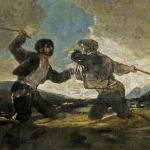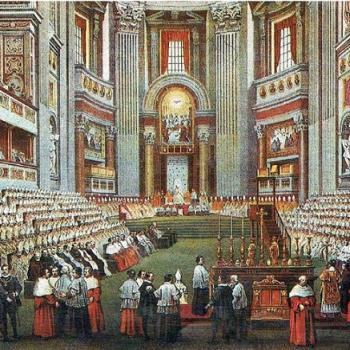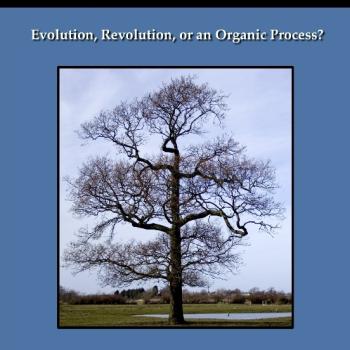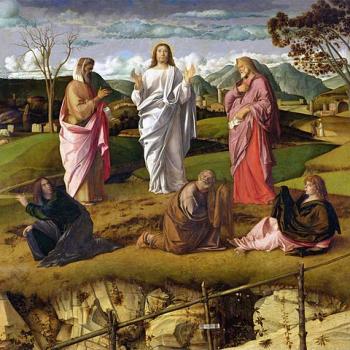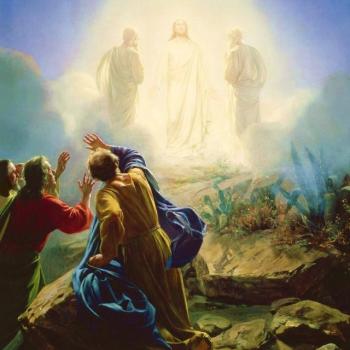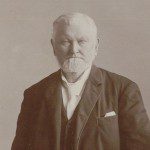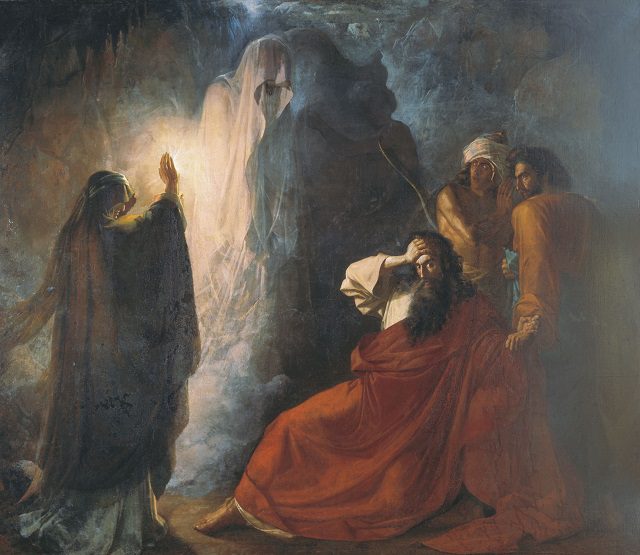
I was made aware of a thread at the blog DeoOmnis Gloria.com: 10 Questions for “Bible Christians.” [link now defunct] It seems that that venue has been visited as of late (starting on 4 January 2007) by a very inquisitive Protestant who wants to learn more about Catholic beliefs: a person who goes by “SandT@cctv.org”.
I think others are doing a good job there, but “the more the merrier”, so I’ll put in my $00.02 worth too, since attempting some sort of answer to “why do Catholics believe so-and-so?” or “how do you support that from the Bible?” is what apologetics is about, and I do apologetics for a living. Besides, it isn’t often that one runs across someone who is vigorously asking about important questions that divide Protestants and Catholics. It’s a great opportunity for constructive discussion. His words will be in blue.
Why do you seek Mary in prayer or any other dead saint? It is not in Scripture.
It certainly is (i.e., asking saints to intercede on our behalf). The dead saints are far more alive than we are, and aware of earthly events (see, e.g., the “cloud of witnesses” described in Hebrews 12:1). Revelation describes those in heaven having “the prayers of the saints” (5:8, 8:3-4), and an angel presenting these to God (8:3-4). What is an angel doing with our prayers, pray tell (no pun intended)?
In Revelation 6:9-10, we see dead human beings praying that God would judge the evildoers (an “imprecatory” prayer, such as found in Psalms 35, 59, 69, 79 and in Jeremiah 11:18 ff., 15:15 ff., 18:19 ff., etc. ). If they can pray for those on earth, then they must be aware of earthly happenings (Heb 12;1); therefore we can make requests of them in prayer. It’s all eminently biblical. Jeremiah 15:1 implies that Moses and Samuel could still pray after they had died.
For tons more biblical argumentation about this and related topics, see my “Saints, Purgatory, and Penance index page.”
The only way you can support this is by adding to Scripture, which is against the word of God . . .
We haven’t added anything to Scripture; we have simply developed notions found in Scripture. according to the authority of Tradition and Church that Scripture itself refers to.
As for praying to the dead:
1. Christ said that two on earth could pray with each other. To assume that he also meant those who have passed into heaven is adding to his word.
Hardly, since Jesus also taught that dead saints were alive:
Luke 20:27-38 There came to him some Sadducees, those who say that there is no resurrection,
28: and they asked him a question, saying, “Teacher, Moses wrote for us that if a man’s brother dies, having a wife but no children, the man must take the wife and raise up children for his brother.
29: Now there were seven brothers; the first took a wife, and died without children;
30: and the second
31: and the third took her, and likewise all seven left no children and died.
32: Afterward the woman also died.
33: In the resurrection, therefore, whose wife will the woman be? For the seven had her as wife.”
34: And Jesus said to them, “The sons of this age marry and are given in marriage;
35: but those who are accounted worthy to attain to that age and to the resurrection from the dead neither marry nor are given in marriage,
36: for they cannot die any more, because they are equal to angels and are sons of God, being sons of the resurrection.
37: But that the dead are raised, even Moses showed, in the passage about the bush, where he calls the Lord the God of Abraham and the God of Isaac and the God of Jacob.
38: Now he is not God of the dead, but of the living; for all live to him.”
If these people are living, and perfected with God in heaven, then they will certainly be praying for those on earth. And if they are aware of earthly happenings (Heb 12:1) then they can be made aware by God’s power, of our intercessions, and present them to God on our behalf (Rev 5:8; 6:9-10).
Also no one in the Bible practiced praying to dead saints.
If dead saints care nothing about the earth and what goes on there, why, then, did Moses and Elijah come back to earth to talk to Jesus (Matthew 17:1-3)? Why did many saints come out of their tombs after the crucifixion, appearing to “many” (Matthew 27:52-53)? Why does God send two witnesses to earth during the last days (Rev 11:3-12). But John, who wrote the book of Revelation certainly believed in this practice, since he wrote about it.
I can find where praying to the dead is considered wrong, can you find where it is encouraged in the Scriptures? Can you find one instance of someone praying to a dead saint in Scripture?
Sure. Tabitha was a disciple in Joppa who died. St. Peter prayed to her when he said “Tabitha, rise.” She was dead, and he was addressing her. Case closed. There is no impenetrable wall between heaven and earth. See: Acts 9:36-41. This is not only praying to the dead, but for the dead, since the passage says that Peter “prayed” before addressing Tabitha first person.
Our Lord Jesus does the same thing with regard to Lazarus. He prays for Lazarus (a dead man: John 11:41-42) and then speaks directly to a dead man (in effect, “praying” to him): “Lazarus, come out” (John 11:43). So you asked for one instance. I provided two.
The Bible tells us that other disciples raised people from the dead (Matt 11:5; Luke 7:22) and records Jesus telling them that they would be able to do so, and should do so (Matt 10:8). Presumably, they would follow the model of Jesus (and later, Peter), both of whom “prayed to” the dead person by addressing them while they were still dead, before raising them from the dead. That means, by direct deduction or implication, that all Christians could potentially “pray to” (or at any rate, communicate with) a dead person.
Prayers for the dead also occur in these two instances, and also by Elijah (1 Kings 17:17-24), and, quite arguably, St. Paul praying for the seemingly dead man Onesiphorus (2 Timothy 1:16-18). One also should note what I have called “the most ‘un-Protestant’ verse in the Bible”: 1 Corinthians 15:29, where Paul casually refers to people “being baptized on behalf of the dead.”
I have argued (exegetically) that this is doing alms and penances on behalf of the dead. But whatever it is, it has to do with folks on earth doing something (penance or praying) “on behalf of the dead.” It’s right there in Paul! Heaven and earth are united in the communion of saints.
Whether you are the person who seeks the medium to reach the dead or you directly communicate with the dead, it is an abomination to God.
That’s fascinating. I agree about the mediums, which is the occult, and condemned, but what about both Jesus and St. Peter, who both “directly communicate[d] with the dead” and thus (according to you) committed abominations?
It’s interesting that your unbiblical position leads you to this conclusion. Jesus (now He is a downright habitual sinner) did the same “abomination” on the Mount of Transfiguration, when He talked to Moses and Elijah: men who had been dead for hundreds of years (Matt 17:1-3).
KJV uses the word necromancer in place of one who calls up the dead, which means the same anyways. Either way, God frowns upon communication with the dead, and it is present in Scripture.
Peter and Jesus certainly “called up the dead” (in a very real, proper sense): they raised them. So did other disciples. I hadn’t heard before that Jesus and Peter were to be classified as “necromancers.” I’ll have to add that to the list of remarkable things I have learned from my esteemed Protestant brethren.
Since it is not in the Bible we don’t accept it . . . the same goes for . . . prayers to dead saints. Once again, because it is not in the Bible and not because of tradition.
What will you do now, then, since I have shown that this clearly is in the Bible? Will you follow the Bible wherever it leads, or stick to the unbiblical traditions of men when you don’t care for something shown to you in the Bible?
If Calvin or the Roman Catholics have a belief, yet cannot prove it via Scriptures and yet still hold on to that belief, then the answer is no. No they don’t hold Scripture with the highest authority. Like I said, the Bible is not vague. Now, if one has a belief and it is not proven via Scripture, if said person lets go of that belief, then they regard Scripture with the highest authority.
Let me do a play-on-words, to describe the situation you find yourself in:
If Protestants claim that some doctrine cannot be proven via the Scriptures and it is shown them that indeed it can be, yet they still deny that belief, then they don’t hold to Scripture as the highest authority after all.
Now, if one disbelieves something but it is proven via Scripture, if said person then accepts that belief and reverses their previously mistaken one, based on false human tradition, then they regard Scripture with the highest authority.
So, once again, just show me where it says that . . . any dead saint was prayed to. Just show me examples in the Bible. You asked me to show you where praying to the dead is wrong, and I did. Now please, return the favor and show me . . . [a]n example of someone praying to a dead saint. If you can show me these things not based on same vague interpretation, but rather reading the plain text, then I will see your reason for these practices.
I am glad to have been of service to you. I love few things, if any, more, than defending and proving Catholic beliefs from the Bible.
Anyone who believes something that is contradictory to Scripture or not proven by Scripture does not hold Scripture with the highest regard.
Oh, I couldn’t agree more, though the “proven” has to be clarified. There is not explicit proof of all things in Scripture; sometimes there are only kernels and deductions.
There is . . . definitely not an example [in the Bible] to pray to the dead.
I look forward to your explanations of my proofs otherwise, then.
Lastly I have shown that praying to the dead or communicating with the dead is an abomination to God. So why do you feel that prayers to saints are acceptable, despite this fact and also knowing there is not a single instance of prayers to the dead that was approved by God in the Bible. So where is your biblical proof. If you cannot show anything just say so. Show me your references and logically break it down. Ultimately I think you will end up either saying because the Vatican says so, or you will copy Karl Keating and post it here.
Man, you sure know how to dig yourself deeper and deeper into a hole, don’t you?
Ok, well whether it is praying to the dead saints or asking them to pray for you, THE BIBLE says that God clearly says that those who communicate with the DEAD are an abomination unto Him.
Right (hey, I can repeat myself, too, if you want to play that game), so when Jesus addresses the dead man Lazarus and communicates with him, he is committing an abomination. When Peter communicates with the dead woman Tabitha before raising her, he is committing an abomination (or are he and Jesus talking to the wind and not to the people involved?). And when Jesus talks to Moses and Elijah on the Mount of Transfiguration, He is committing an abomination.
And whoever talks to the dead people who came out of their tombs after the crucifixion are also guilty of the same thing. And not just that; according to your “logic” in citing Deuteronomy 18:9, Jesus and Peter and these folks who talked to dead people in Jerusalem on Good Friday must have been either witches or soothsayers, or sorcerers, or mediums, or spiritists or some other such occultic category.
So you prove from Scripture that Jesus and Peter are evil and of the devil. That’s no mean feat! One can only be awestruck at such chutzpah.
Anyone who believes something that is contradictory to Scripture or not proven by Scripture does not hold Scripture with the highest regard.
Oh, I couldn’t agree more, though the “proven” has to be clarified. There is not explicit proof of all things in Scripture; sometimes there are only kernels and deductions.
Rather I hold to the fact that I can be taught and corrected with the Scriptures, since they are all God Breathed. If you can show me clear proof, then I will believe.
Excellent. I eagerly look forward to your retractions, then.
*
That’s not what Holy Scripture said, which was, rather, that he died because he consulted the medium. Using mediums or engaging in other abominable occultic practices are not the sum total of all possible communications with the dead. In fact, the parallel passage you refer to disproves your position, because the real prophet Samuel appears and tells Saul the truth, during the seance with the witch of Endor (1 Samuel 28:7-20).
That was God’s will, because demons and false spirits would not tell the truth. Therefore, it was another instance of God desiring to break the artificial Protestant barrier between heaven and earth, by sending Saul to break through the nonsense of the seance.
God says that those who call up the dead, a.k.a a necromancer are an abomination to God. The medium who called up on Samuels spirit is a necromancer. She called up on the dead. She was an abomination to God. Not only that, God instructed to avoid spiritists and mediums, for they are detestable to Him. Whether you turn to a familiar spirit(which are what dead saints are), or medium, or you call up on the dead…it is all wrong according to God. It is clearly stated.
Absolutely. But you are not content with what the Bible plainly teaches. You want to go beyond that and condemn any asking of dead saints to pray for us at all, or any communication with the dead (no matter how expressly biblical) at all. You take it too far. You wrote: “Whether you are the person who seeks the medium to reach the dead or you directly communicate with the dead, it is an abomination to God.”
But you want to dig yourself deeper into the hole you are in:
All of it is wrong. Now you as a Catholic do not use a medium, however you do call up on Mary or St. whomever. Guess what, you are calling up on the dead. God finds this detestable. LOOK at the verse. [Deut 18:9] It is clear, THERE IS NOTHING VAGUE ABOUT THE PASSAGE.
Okay; you had a chance to make the logical distinction but you failed to do it. So you again reiterate that Jesus and Peter “called up the dead” since they communicated with two human beings who were dead, before they raised them. One would think that a position that entailed our Glorious Lord and Savior and Redeemer Jesus Christ being the sinful equivalent of a medium or a sorcerer would give one pause and wake them up to how ridiculous their extreme, unbiblical position is.
There is nothing wrong with resurrection. That does indeed show God’s power. However, I don’t see your point, because when they appeared to the many people…they were no longer dead. They were very much alive. God here is not allowing a communication between the living and the dead.
You miss the point entirely. These people were dead, and they were also alive (in the afterlife). The two are not mutually exclusive. Those who die in Christ are alive: more alive than we are ourselves. All “death” means is the temporary separation of the soul from the body. So you don’t get out of your difficulty by saying that these people are now “alive” (i.e., from our earthly, temporal perspective) simply because they returned to earth.
Where a soul resides has nothing to do with whether it is alive or dead or not. The persons who lived on earth were dead, but they were alive after they died. They remain “dead” from our perspective, wherever they are. Therefore, this is communication with the dead.
You have not found any Scripture that overrides Dt. 18:9.
We don’t have to because we don’t disagree with it! What we are saying is that the notion of “communicating with the dead” is a larger category than simply the occultic variant of that. There is a good, divinely-approved practice in this regard and an evil one.
***
(originally 3-1-07)
Photo credit: The Shade of Samuel Invoked by Saul (1857), by Nikiforovich Dmitry Martynov (1826-1889) [public domain / Wikimedia Commons]
***



